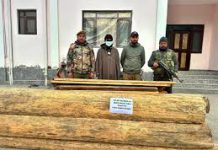A Song on his Lips
Rishab Raino – AKA Rishab Chaku – a young rapper & singer from the Valley of Kashmir is blazing his own trail in the field of music. Here, he talks about his inspiration, growth, and what it’s like navigating this space through the ebb and flow of conflict.
“Jalte parwaane udte dikhe aasman mei, woh sab rangeen roohein sabhi tere raaste pe, iblis ka na khauff dikha unke aankhon mei tha, khwaja ram karke bade tere raaste pe, ek main jo tere deedar ke khoj mei hu, aankhon mei patti, mujhe dikhte bhi naa raaste, baitha main kainaat ke ped ke neeche ek, guzra fakir bola, andar sab hi raastey”
Singer, lyricist, rapper, and music composer Rishab Raino’s appearance – tattoos, multiple rings, bomber jacket, and striking red Jordans – belies his depth of spirit and maturity. Most would find it hard to believe that the Sufi-esque words above were in fact woven by this 26-year old hip-hop attired young man. But that’s Raino AKA Rishab Chaku for you. A glamorous songster one moment, an unobtrusive poet the next.
A Natural Songster
Born in Srinagar and raised partly in the Valley and partly in Ludhiana, Punjab, Raino’s musical odyssey began as a preteen back vocalist. Inspired by the Punjabi pop zeitgeist – hip-hip had steadily begun penetrating Punjabi folk and ethnic songs – he began rapping and writing his own songs at the time. Though he went on to earn a degree in Civil Engineering, Raino never wanted to take up anything for a livelihood other than music. Like all middle-class families, his family was hostile to the idea. “There has been little to no family support for my profession. And I am used to pejorative remarks from nearly all my relatives!” he adds with a reconciliatory grin.
Though originally more into solo hip-hop, Raino currently works on different genres including pop rap, cringe, Sufi songs, and romantic songs. “Barring metropolitan cities, solo hip-hop does not have much of an audience. It is not financially lucrative for me as an artist. My heart continues to be in hip-hop, but most of the labels I am working with want me to produce conventional music. And I need the money from the music I don’t enjoy too much to continue making the music I truly enjoy. If there’s no money coming in, I’ll have to stop making music altogether – and that’s something I would never wish to do” he says resolutely.

Above: Rishab Raino’s musical journey began as a back vocalist at the age of 11. Photograph by Nandini Sen
Other than composing and singing his own songs, the last couple of years have seen Raino dabble in other aspects of music production such as video editing, video direction, and mixing-mastering. “While I have to take up these multiple responsibilities owing to financial constraints, it is – in a way – a good thing. I am getting to learn so much” he says.
Besides taking caring of multiple aspects of music-making, Raino currently sings and raps in three languages – Kashmiri, Hindi/Urdu, and Punjabi. His rap compositions typically have a lot of English blended in as well.
Rebel with a Cause
Unlike most commercial rappers whose compositions predominantly revolve around women, drugs, and violence, Raino’s songs are often politically charged, or serve as a tool for social commentary. He has sung about deeply entrenched corruption, problems faced by the common man, and misuse of religion for political gains. He has also created songs denouncing particular events such as the Nirbhaya gang-rape and murder and exodus of Kashmiri Pandits. The opening lines of his song titled “1990: Unheard Truth” are:
Unnisso nabbe ki kahani, jab huya tha andhera aur bhidne lagi thi aandhiyon se aandhi; ghar se beghar huyi thi meri qaum; sade teen lakh ke kaafile pe huyi thi manmaani.
Despite his talents, it’s a double whammy being a pop rapper/singer in Kashmir. “I come from a region where music itself is denigrated and musicians derogatorily referred to as “band”. If that weren’t enough, as someone belonging to a community that is known for its intellectual achievements and scholarship, my choice of profession is at best met with bafflement and at worst, disdain” he says. Thus, having taken up music, he is considered a rebel both ways – by fellow Kashmiris in general, and his own family and community members in particular.
Being a musician in a conservative place like Kashmir isn’t without its fair share of rewards though. “While growing up, I had no local inspiration to look up to or learn from” rues Raino. “But because there are still such few people taking up music professionally, rapper-singers like us serve as role models for younger people who are keen on pursuing music. I, for one, am always happy to try and help out whoever seeks my help in terms of music” he adds, his voice tinged with pride.

Above: Raino at the outdoor shoot of a video. Photo courtesy of Rishab Raino
Raino avers that, as a musician, he has never faced any kind of singling out because of his religious identity. “My being Hindu, or my fellow musicians being Muslims is merely a coincidence. We bond and connect with one another at a level that transcends our religious identity. We are artists first, both them to me, and me to them.”
Music in the Time of Fragile Peace
With peace having returned to the Valley – at least on the surface – it may be a good time for cultural arts such as music to flourish. But for a region that has, for decades, teetered on the edge of full-blown conflict, peace has always been fragile. “Though I have received several opportunities of late and I think this is a great time for us, I don’t want to get over-optimistic…lest I should be disappointed!” says Raino.
Labels that have recently approached him and he is working with, include Kashmir Originals –the Valley’s home-grown version of Coke Studio – New Zealand-based Hi Officer Music, and Srinagar-based SearchKashmir. “There are a few more projects in the pipeline that are a little early to talk about” says Raino. Fame is no longer a distant dream, what with his YouTube videos garnering 0.2-0.3 million views on an average, within a few weeks of their launch. Recent months have seen Raino dabble in new, exciting ventures such as a musical collaboration with well-known Kashmiri singer Waqar Khan for Kashmir Originals titled “Choan Rokh Posh”. The future looks promising.
While Raino still does not enjoy complete family support, the old cynicism and scepticism has somewhat softened, thanks to his palpably growing popularity. Like most Indian fathers, Raino’s father’s misgivings about his choice of occupation stems primarily from a sense of apprehension. “My father had been a theatre artist in his youth; albeit one who couldn’t taste success despite his talents. To this day, he feels that success in a creative vocation is driven largely by fate, not skill. Hence, he continues to maintain a façade of stiff opposition” says Raino “But although not fully reconciled to my taking up music as a profession, I see him yielding a little – every day. When he sees the large number of likes for my songs on Facebook and YouTube, or when someone meets him and tells him of the great work I am doing…I haven’t failed to notice the glint of pride in his eyes” he adds.
Does Rishab Raino ever fear for his life? Particularly after the recent spate of targetted killings of Kashmiri Pandits in the Valley? “Yes, I do feel afraid. I fear for my life and safety and that of my family. The firing of a few bullets could end everything” says Raino with a slight wince. “But music gives me solace. When I sit down to create a song, compose the tune; think up the lyrics…I lose myself in the process. There is no terror or trepidation; only the joy of music” he signs off with half a smile and eyes filled with hope.
Nandini Sen
Guest Writer




